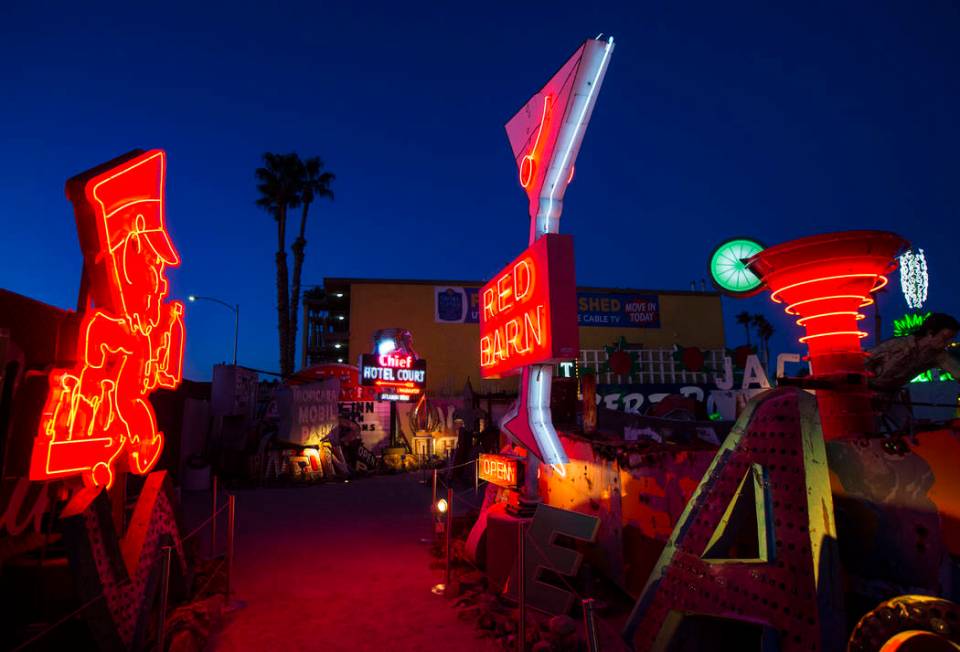Teacher, students behind push to make neon Nevada’s official element

CARSON CITY — Few things are as synonymous with Las Vegas and the Silver State as neon.
For nearly a century, the noble gas has helped light up some of the most iconic signs across Nevada — like the world-famous “Welcome to Fabulous Las Vegas” sign on the Strip and the Reno Arch — and became a staple of the hotels, motels and casinos from Elko to Laughlin. There’s even an entire museum in downtown Las Vegas dedicated to Nevada’s iconic signage in the aptly named Neon Museum.
Now, a freshman lawmaker and a group of schoolchildren from Carson City hope to enshrine the gas in Nevada lore by making it an official state symbol.
But the reasoning for the bill goes beyond the bright lights and big cities. It represents a key component of Nevada’s culture and history, said the bill’s sponsor, Assemblywoman Sarah Peters.
“We see neon as this blossoming image of civilization and culture of the state, from the Strip in Las Vegas to the Reno Arch, or in rural Nevada, where it signifies an open coffee shop or hotel,” said Peters, a Reno Democrat.
The bill, which counts 15 other Assembly members as sponsors, was introduced last week and seeks to designate neon as the official element of Nevada.
That would put it alongside the likes of silver, the state mineral; sagebrush, the state flower; and the desert bighorn sheep, the state animal.
Some states, including Nevada, have designated elements like silver or gold as their official state mineral, but no state in the U.S. appears to have a formal state element.
Connecticut lawmakers considered a bill in 2015 that would have designated titanium its state element, an idea that came from a high school class, but that push eventually died.
Peters’ name is on the legislation, but a group of schoolchildren and their teacher are the driving force behind Assembly Bill 182.
Will Durham, 45, a Carson City teacher and director of the Nevada Neon Project, has been collecting and preserving neon signs in Nevada for more than 20 years.
His collection of the signs started when he was in his early 20s, when a motel that was closing planned to throw away its neon diving swimmer. Durham got it before it ended up in the trash.
“I started looking around and realizing all of these iconic properties were closing, and their signs were in danger of being scrapped,” Durham said. “I just started doing everything I could to preserve these signs all over Nevada.”
And he has seen that the miles of brightly colored gas bent into words and pictures are ingrained into the very being of Nevada.
“I realized just how important this is to our cultural history,” Durham said.
Durham said he has preserved more than 100 signs from across the state over the years. Some are on display at the University of Nevada, Reno and at the Western Folklife Center in Elko.
The idea for the bill came to Durham in 2017, but after the Legislature was in session, and it was too late to take the idea from concept to bill.
So he waited. And after the 2018 election, Durham started asking around about which of the 63 lawmakers might be best to carry such a bill.
The feedback was unanimous, Durham said. Peters, the freshman assemblywoman from Reno and an environmental engineer by trade, was the perfect fit.
“I was excited that these kids wanted to be involved. And when they brought the idea to me, I could see almost immediately the cultural significance, the historic significance for the state of Nevada,” Peters said.
“I think by making space for them and including them in the process, we kind of facilitate that love for how we run the state of Nevada,” she added.
Durham saw the bill as an opportunity to cement the element as an official icon of Nevada. But he also saw it as a learning opportunity for his students.
Durham is a fifth- and sixth-grade teacher at Carson Montessori School, a public charter school in Carson City.
Durham, his students and Peters have since been working together in the classroom on every part of the process, from writing the introduction of the bill, drafting press releases and even calling lawmakers to explain what the bill is and ask for their support.
The experience, Durham said, has “empowered the students.”
“They could see that something they did could be important and could be recognized,” he said.
And while the bill has a long way to go before possibly becoming law, Durham isn’t worried. For him and his students, the experience is what matters.
“Even if the bill doesn’t pass, it’s going to be a success because it’s learning the process,” Durham said.
Contact Capital Bureau Chief Colton Lochhead at clochhead@reviewjournal.com or 775-461-3820. Follow @ColtonLochhead on Twitter.